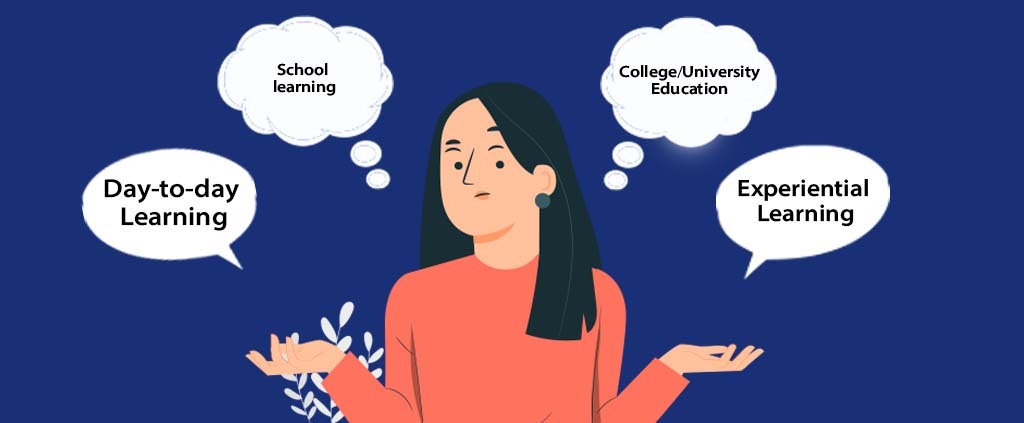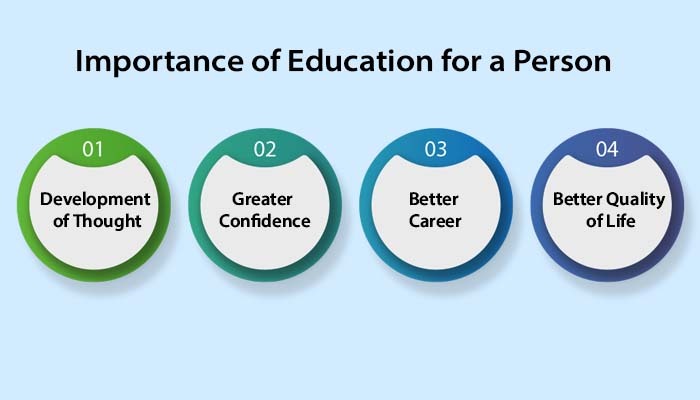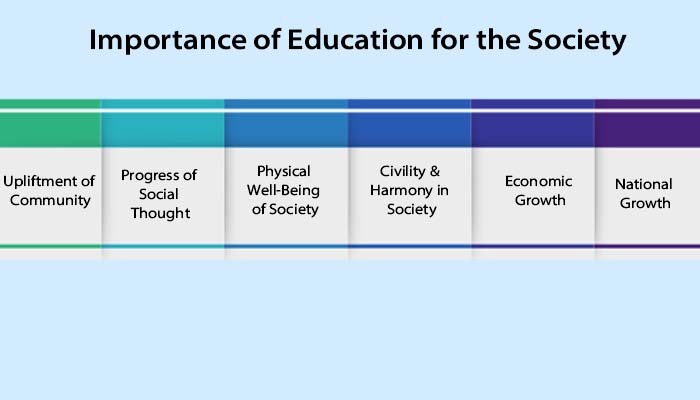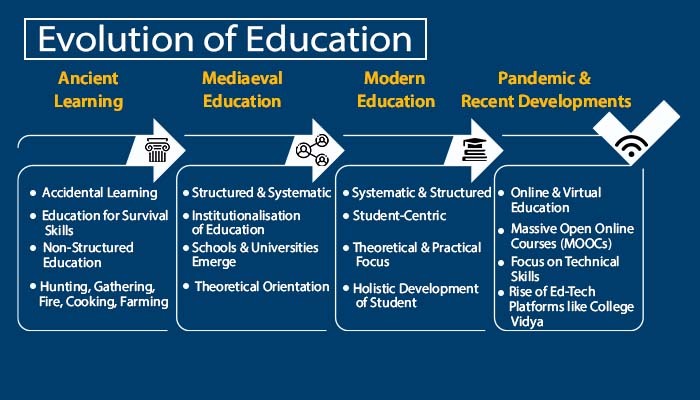“Give a man a fish and you feed him for a day. Teach a man to fish and you feed him for a lifetime” –Maimonides
This quote very aptly sums up the essence of education- it is a force that supports our lives like a pillar as years turn to decades. Education today has become a fundamental aspect of our lives, but seldom is its role recognized or appreciated. Education is an important area of life that affects us in a large number of ways.
What is Education?
But before one appreciates education and the role it plays in our lives, it is important for us to understand what education is.
Education is formally described as a purposeful interaction with the aim of transmission of skills, knowledge, as well as fostering certain values and character traits. It is often conventionally thought of in terms of the process of learning through books or in a classroom, but true educational experiences are scattered all around us from mundane household conversations and chores to learning new skills at the workplace or during playful or leisure activities through experience. Education is an all pervasive process.

How does Education Impact Us? The Importance of Education in Life
Thinking about how education impacts our lives, many thoughts spring to mind. Education and learning have a role to play in our lives, be it in miniscule, micro aspects of it or the all-encompassing, major aspects of our lives. The most astounding aspect of it is the fact that education importance is not limited to the impact on a personal level, but goes much beyond to have an impact at the community level as well. Here we have enumerated some of the many ways in which education and learning are important in our lives.
Importance of Education in an Individual’s Life
At the most basic level, one can experience the importance of education through one’s own life, at the individual level. Education impacts us, playing a role in our overall well-being and developments.
– Education and Development of Thought
One of the central tenets of good education is that it is able to affect the thought and analytical skills of a person for the better. Good education fosters the ability to think and analyse aspects of our life, our surroundings and our relations with others in a better fashion, with a broader perspective as well as greater understanding and knowledge.
Education helps us know more about various aspects of life, be it a specific domain or a broad spectrum of topics. This is one of the main aims of education-to disseminate knowledge to the learner in a useful way that helps them function better in life. It helps us develop critical thought, the ability to analyse as well as question various aspects of life if needed.
– Education and Confidence
This is another way in which education is important in our lives. With education, a person’s knowledge domain expands, which is usually associated with a greater level of confidence in oneself. With good education, a person becomes more self-reliant and consequently one’s belief in themselves also escalates. Thus, not only does education help to increase our knowledge, but through it, it helps us develop a broader outlook and increase our self-confidence.
– Education and Career
This is one of the most obvious importance of education. A good education is important to be able to excel in any career today. With fields becoming complex and evolving each day, it is important for learners and professionals to continuously keep on updating their skills and knowledge. Such developments have led to the development of the idea of lifelong learning and education.
Career fields today demand professionals to have detailed and specific knowledge in a particular field rather than broad but basic knowledge in a wide domain of subject areas. The role of education in such a case, especially that of higher and professional education is imperative. Various educational platforms today help students to get easy access to higher education which is convenient and easy to pursue, so as to upskill themselves as well as escalate effectively through the professional ladder.
– Education and Physical Safety
Although this relationship may not be very apparent initially, education has a role to play in our physical safety as well. Although as humans we are born with survival instincts, much of what we do to protect ourselves from threats in life are learnt. For example, we learn how to protect ourselves from sharp objects, or in case of a natural calamity through planned and learnt behaviours, which are taught to us since childhood.
Similar to how our ancestors learnt various skills to be able to survive better, education plays an important role to help us protect ourselves from dangers and ensure our physical well-being. In addition, as already stated, education helps us enhance our career effectively, which means that through a good education, a person can have a safe and stable life, with security and access to basic amenities which ensure a better quality of life as well.

As is evident from all the important roles that education comes to play in our personal lives, it is clear that it is conducive to our overall well-being. Not only does education ensure that we develop our knowledge and skills, it also fosters our physical and mental health in indirect ways. So, the impact and importance of education in our lives is immeasurable.
Importance of Education for the Society
The role of education is not just limited to its effect on an individual but extends much beyond that. Education is a fundamental pillar of society and its growth and development. The role that a good educational system plays for uplifting the society and any community in general is huge and irreplaceable.
Here are some of the ways in which education has a role to play in society.
– Education and the Upliftment of a Community
Education is an essential tool for the upliftment of any community. It is the force that helps to bring knowledge to a community as well as develop its own knowledge base (e.g. in the form of rituals, practices, own scriptures and more) to a more refined state. Moreover, educating a disadvantaged community helps in their upliftment as it enables their mainstreaming and provides them with better opportunities to excel in the modern world in terms of their career.
For instance, with the measures taken by the Indian government to provide reservations in educational and professional domains to certain backward communities and tribes, they have been able to get more mainstream opportunities and representation, which has also led to greater realisation and maximisation of potential, ultimately culminating in their upliftment and progress.
– Education and the Progress of Society
Sorting through many examples in history, the role of education in the upliftment of a community is evident. Education is indeed a beacon of power and light for any community. Just as it helps a person hone their thought and perspective, the effect of good education seeps to the entire community and helps to develop its perspective to a broader one.
It encourages members of the community to analyse various aspects of the community’s practices and beliefs, understand them better or conversely criticise the regressive aspects and abandon such practices. Education helps the members of a society to understand and propagate their culture while at the same time leaving behind the regressive or obsolete aspects of it.
– Education and Physical Well-Being of the Society
Education in general is related to the physical safety and well-being of a community as well, such as through educational measures like spreading awareness, sensitising the members of a society for better health practices etc. For example, spreading awareness about the spread of communicable diseases as well as educating learners about such issues from a young age can ensure better community health measures and practices leading to greater health in the society.
– Education and Well-Being of a Community
As the members of a community get educated and grow their domain of knowledge, skills and traits, the community as a whole moves closer towards the goal of well-being. A strong educational base fosters the sense of mental and physical well-being of a community helping to elevate the overall quality of their life.
– Education and Civility in the Society
It is rightly said that an educated society is a civil society. Research has pointed out that when the members of a society are well-educated, the crime rates, acts of violence, vandalism and hate crimes decline. Although not an assured effect, education fosters a sense of peace and harmony in a society, despite differences.
An educated society is able to tolerate differences among members, as well as effectively learn and use them to grow further. Moreover, a good education for the members of the society also helps alleviate poverty and leads to a stability in their lives.
– Education and National Growth
Education today being closely related to career growth, it is no surprise that it is related to the economic prosperity of the nation as well. An educated and skilled workforce is able to mobilise and utilise the national resources better as well as ensure a higher contribution to the nation’s growth index (e.g. Gross Domestic Product or GDP).
Strong educational base builds an educated and qualified bureaucracy that can help a nation to establish better ties with other nations and improve international diplomatic relations as well. Thus education is undoubtedly the cornerstone of national prosperity and holistic growth.

So, it is evident that students who focus on education today can transform the face of the society and country tomorrow. Education is all-pervasive and everlasting in its impact on the society and with a strong base of education, it is possible for an individual as well as the society to change for the better.
Evolution of Education- History of Education
The evolution and change in the educational domain is another aspect worth investigating here. Education, like all other aspects of human knowledge and development, is dynamic and constantly evolving, with an influx of new perspectives.
– Ancient Human Education
Starting off as the acquisition of skills such as hunting, rearing and farming that helped in basic survival, education evolved to include transmission of knowledge of a diverse range of fields. Human ancestors relied on learning by chance and trial and error for acquiring various skills that helped in thriving in the wild and unharnessed natural habitat- hunting, gathering, carving stones to make weapons, cooking, lighting a fire and finally culminating in learning how to farm. These skills required training for effective survival.
– Education in Mediaeval Periods
The mediaeval periods saw the evolution of all aspects of human lifestyle to take on a more complex, systematic and sophisticated form. Education in ancient humans was mostly unstructured, occurring through chance and in a non-institutionalised manner, i.e. without any specific format, structure and in an institution.
Over centuries, the system of education evolved into a more structured framework, with an advent of institutionalisation of education.
During the mediaeval period, for instance, education became more sophisticated, moving closer to the form we see it now in. It became an institutionalized framework, with schools and institutions of higher education in the form of universities emerging. Renowned universities like the University of Bologna, Oxford University, University of Paris etc. came up as centres for people to pursue education in a systematic form.
India also emerged as the centre for some of the oldest universities like Nalanda and Taxila. Institutions like gurukuls, where learners stayed with their “guru” (a mentor) to acquire knowledge and skills of specific domains like archery etc. This is not to say that education was limited to institutions. Just like proponents of schooling and institutional education, there were detractors to it as well, who supported the idea of a more social education, home-schooling or experiential learning rather than mandatory attendance in a classroom.
All things being considered, the major highlight of this period was the institutionalisation and structuring of education, with more focus on acquisition of knowledge than skills. However, the access to education wasn’t equitable, as only members of privileged families, in specific males, had easy access to educational resources at their disposal.
– Modern Education
Education is now a much more nuanced concept, with its tenets, focus and aims having evolved manifold. Education today is focused both on knowledge domains as well as effective development of skills and competencies that help to practically excel at a task.
Along with schools, academies, colleges and universities offering regular classroom educational programmes, correspondence education has emerged as a means of education not requiring the learner to sit through a classroom lecture for learning. There is an emphasis on the development of technical skills, professional training etc. Modern education is institutionalised, structured and complex. The focus is on the holistic development of the learner, and not just their knowledge in a discipline.
The Wake of the Pandemic and Online Education
The field of education has always been in a state of flux, but with the global coronavirus pandemic hitting all aspects of the human lifestyle, education received a major blow as well. Being a conventionally institutional activity happening in a classroom where teachers and learners are physically present together, education came to a standstill with the shutting down of schools, colleges and universities due to mandatory physical isolation.
In this situation, education underwent a major transformation, with the process shifting from physical interaction to virtual interactions. The last couple of years bore witness to a shift of the teaching-learning process to the virtual domain, with the use of Information and Communication Technology (ICT) means to ensure education remains unhampered despite physical constraints.
This change came with the added advantage of making education more accessible to students who were not able to take it up due to inability to relocate/attend physical classes in a school/college/university. Online education came as a boon for all individuals interested in learning and continuing their educational journey, allowing flexible and convenient learning without the need to be present physically in a classroom to gain knowledge.
With the same intention at heart, we at College Vidya are helping students become more aware of online and distance education, providing valuable and unbiased guidance and educational services to learners. As an edtech platform and organisation, we strive to help students find the best alternative for their educational journey, considering the impact of such important decisions on their future.
We provide students with assistance in comparing their options for online universities and courses, suggest them the best-suited university based on their educational needs, and help them connect to the top online educational universities and institutions in the nation. College Vidya provides unbiased and authentic career and academic counseling to students as well to guide them in making career and educational decisions.
So, with a changing landscape of the educational sector, its role and means of delivery is also becoming more user-oriented and student-centric. Online education is getting more mainstream attention, and contributing to equitable access to education to everyone.

Conclusion
Education as a process begins in the very early years of childhood and continues till the person’s last day of life. Thus, it is hard to point out a time when education ceases to be an important aspect of one’s life. In this world, we are all learners on a quest for knowledge, sometimes through conscious efforts and at others unconsciously. Education is undoubtedly very important for our well-being, prosperity, as well as the growth and progress of the society.







